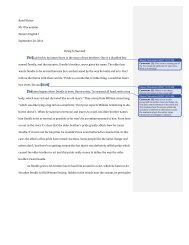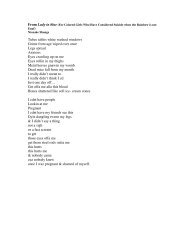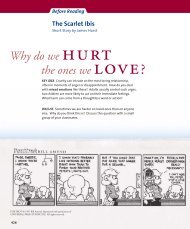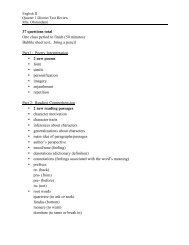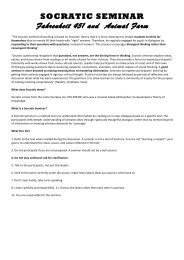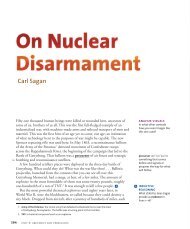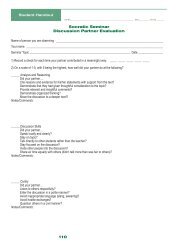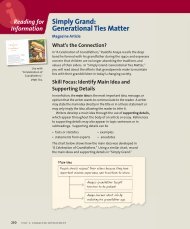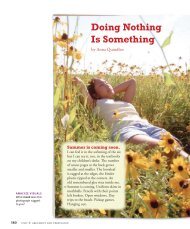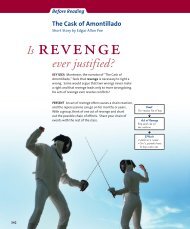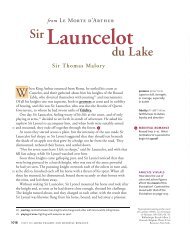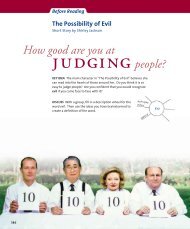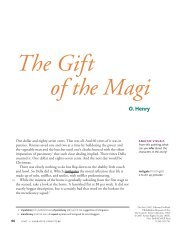The Language of Poetry - LanguageArts-NHS
The Language of Poetry - LanguageArts-NHS
The Language of Poetry - LanguageArts-NHS
You also want an ePaper? Increase the reach of your titles
YUMPU automatically turns print PDFs into web optimized ePapers that Google loves.
TAKE NOTES<br />
How are contradictory<br />
emotions important to<br />
the form <strong>of</strong> the blues?<br />
c TAKE NOTES<br />
Review the author’s<br />
list <strong>of</strong> blues subjects.<br />
What attitude do blues<br />
songs express about<br />
these subjects?<br />
744 unit 7: the language <strong>of</strong> poetry<br />
30<br />
40<br />
50<br />
But another saying knows the opposite is true: the blues ain’t nothin’ but a<br />
bad woman (or man) feelin’ good. b<br />
. . . As Langston Hughes <strong>of</strong>ten said, the blues are “laughing to keep<br />
from crying”; the fact that this line also appears in the song “Trouble in<br />
Mind” tells us that even when there’s trouble, we still can laugh about it.<br />
We must, the blues insist. Ralph Ellison puts it this way:<br />
<strong>The</strong> blues is an impulse to keep the painful details and episodes <strong>of</strong><br />
a brutal experience alive in one’s aching consciousness, to finger its<br />
jagged grain, and then transcend it, not by the consolation <strong>of</strong><br />
philosophy but by squeezing from it a near-tragic, near-comic<br />
lyricism. As a form, the blues is an autobiographical chronicle <strong>of</strong><br />
personal catastrophe expressed lyrically.<br />
Indeed, for me the blues provide a fresh way to express the lyric poem’s<br />
mix <strong>of</strong> emotion and intensity, all the while evoking not so much strict<br />
autobiography as a personal metaphor for life’s daily struggles. “You’ve<br />
been a good old wagon, but you done broke down.”<br />
<strong>The</strong> blues can be about work, or the lack <strong>of</strong> it; about losing hope or your<br />
home, your lover or your mind or your faith; or all <strong>of</strong> these at once! <strong>The</strong><br />
blues are unafraid <strong>of</strong> talking about violence, whether <strong>of</strong> the physical kind<br />
(as reflected in Hughes’ “Beale Street Love” and Ma Rainey’s “See See<br />
Rider Blues”) or the <strong>of</strong>ten more troubling psychological sort. Still, the<br />
heartbreak the blues rails against and trains us to overcome is never far<br />
from ironic and even comic, and for every “Nobody Knows You When<br />
You’re Down and Out,” Bessie Smith declares “Tain’t Nobody’s Business if I<br />
Do.” That Nobody sure is fickle. c<br />
<strong>The</strong> blues ain’t polite—they don’t say please, though sometimes they say<br />
“Good Morning.” <strong>The</strong>y are, in the end, <strong>of</strong>ten more loyal than the sweet<br />
mistreater whom the singer loves but wants “to lay low”. . . after feeling<br />
low for days. Or nights—the blues after all, began as Saturday night<br />
entertainment, making us laugh and move and maybe even forget our<br />
troubles, not by pretending everything’s all right, but by admitting it’s a<br />
hard road full <strong>of</strong> forks and crossroad devils. By finding out that the<br />
powerful voice onstage, or on the jukebox, or coming from the radio, has<br />
been there too. <strong>The</strong> blues are loyal to a fault.



